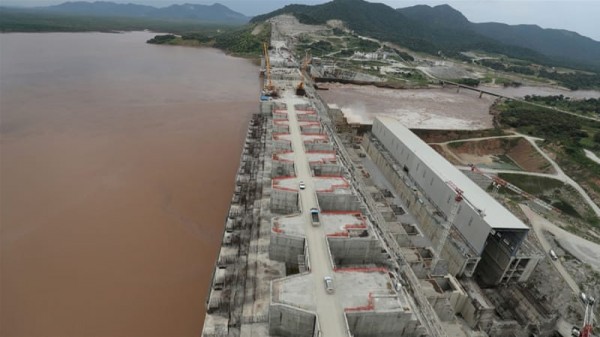Go Back
EGYPT, ETHIOPIA AND SUDAN TO AGREE NILE DAM DEAL 'IN TWO WEEKS'
Three countries will reach a
'final agreement' in two weeks, Ethiopia announces after African Union online
summit.
Egypt, Ethiopia and Sudan will
agree a deal to fill the giant Blue Nile dam in two to three weeks, following
mediation by the African Union to broker a deal to end a decade-long dispute
over water supplies.
Tortuous negotiations over the
years have left the two nations and their neighbour Sudan short of an agreement
to regulate how Ethiopia will operate the dam and fill its reservoir, while
protecting Egypt's scarce water supplies from the Nile river.
Ethiopia's water minister,
Seleshi Bekele, said that consensus had been reached to finalise a deal within
two to three weeks, a day after leaders from the three countries and South
African President Cyril Ramaphosa, who chairs the African Union (AU), held an
online summit.
The announcement late on Friday
was a modest reprieve from weeks of bellicose rhetoric and escalating tensions
over the $4.6bn Grand Ethiopian Renaissance Dam, which Ethiopia had vowed to
start filling at the start of the rainy season in July.
Ethiopia has hinged its
development ambitions on the mega-project, describing the dam as a crucial
lifeline to bring millions out of poverty. Egypt, which relies on the Nile for
more than 90 percent of its water supplies and already faces high water stress,
fears a devastating impact on its booming population of 100 million.
Press Release on The Extraordinary Meeting of the Bureau
of the African Union Assembly on the Grand Ethiopian Renaissance Dam#PMOEthiopia
pic.twitter.com/a7168n6iL7
Sudan, which also depends on the
Nile for water, has played a key role in bringing the two sides together after
the collapse of United States-mediated talks in February.
After the AU video conference
chaired by South Africa on Friday, Egyptian President Abdel Fattah el-Sisi said
that "all parties" had pledged not to take "any unilateral
action" by filling the dam without a final agreement, according to state
media.
Sudanese Prime Minister Abdalla
Hamdok also indicated the impasse between the Nile basin countries had eased,
saying the countries had agreed to restart negotiations through a technical
committee with the aim of finalising a deal in two weeks.
Ethiopia won't fill the dam before inking the much-anticipated deal, Hamdok said in a statement, adding: "Sudan is one of the biggest beneficiaries from the dam and also one of the biggest losers if risks are not mitigated, thus it urges Egypt and Ethiopia to the impending necessity ... of finding a solution."
AU Commission Chair Moussa Faki
Mahamat said in a statement that more than 90 percent of issues in the talks
had been resolved, and that a committee of representatives of the three
countries, South Africa, and technical personnel from the AU, would work to
resolve outstanding legal and technical points.
The committee would issue a
report on progress of the negotiations in a week.
Egypt calls on UN to intervene after impasse in Nile dam talks (2:14)
Sticking points in the talks have
been how much water Ethiopia will release downstream from the dam if a
multi-year drought occurs and how Ethiopia, Egypt and Sudan will resolve any
future disagreements.
Both Egypt and Sudan have appealed to
the United Nations Security Council to intervene in the years-long dispute and
help the countries avert a crisis. The council is set to hold a public meeting
on the issue on Monday.
Filling the dam without an
agreement could bring the standoff to a critical juncture. Both Egypt and
Ethiopia have hinted at military steps to protect their interests, and experts
fear a breakdown in talks could lead to open conflict.
Joseph Siegle, director of
research at the Africa Center for Strategic Studies based at the National
Defense University, called Ethiopia's change in position
"significant".
"The Ethiopian agreement to
wait, that's a big pause - in terms of the pressure that was building up on
this discussion," he told Al Jazeera, adding that he hoped to see a resolution
shortly.
"Ethiopia feels pressure
because the next two months are the rainy season. The dams down the river,
including the Aswan High Dam, they are at their near capacity," said
Siegle.
"So this is actually a
really good time to start filling the dam. It would least affect Egypt. So
Egypt has some incentive to agree to get this going at this point in time. In
the best-case scenario, they will get back to the negotiating table and they
will come to a quick agreement and then move this forward."


